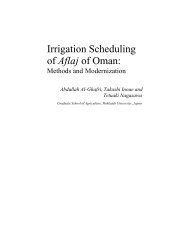The Global Water Crisis: Addressing an Urgent Security - Unu-inweh ...
The Global Water Crisis: Addressing an Urgent Security - Unu-inweh ...
The Global Water Crisis: Addressing an Urgent Security - Unu-inweh ...
You also want an ePaper? Increase the reach of your titles
YUMPU automatically turns print PDFs into web optimized ePapers that Google loves.
2. <strong>Water</strong> as a Collective Good<br />
According to Gentes (2002), the essential elements of the subsistence strategy of indigenous peoples are collective property<br />
<strong>an</strong>d kinship. <strong>The</strong> adv<strong>an</strong>tages of having a common property system is that water resources represent undividable goods that<br />
require <strong>an</strong> integrated m<strong>an</strong>agement of the catchment, <strong>an</strong>d that access, use <strong>an</strong>d m<strong>an</strong>agement of these resources become<br />
socially controlled <strong>an</strong>d regulated. <strong>The</strong> regulation of water resources in indigenous territories is carried out by me<strong>an</strong>s of<br />
rules that are largely structured within concrete practices, beliefs <strong>an</strong>d socio-cultural values. Uses <strong>an</strong>d customs become<br />
local regulation systems, in m<strong>an</strong>y cases based upon the consuetudinary or <strong>an</strong>cestral laws of indigenous peoples that were<br />
established before the formation of nation-states; in the case of Latin America, corresponding to the pre-Hisp<strong>an</strong>ic period.<br />
As a result of this social org<strong>an</strong>ization, accumulation of goods by families is limited in favour of communitari<strong>an</strong> reciprocity.<br />
Conversely, autonomy of indigenous peoples with respect to state power guar<strong>an</strong>tees access to natural resources present<br />
in the territory <strong>an</strong>d establishes that the appropriation of water be based on kinship <strong>an</strong>d cooperation.<br />
However, as stated by Boelens et al. (2006), in a scenario of growing scarcity <strong>an</strong>d competition for water resources, water<br />
rights become essential in the struggle of indigenous peoples for defending their territory. Control of water resources is<br />
both a source of power <strong>an</strong>d of conflicts because it is strategic for productive, social <strong>an</strong>d cultural activities <strong>an</strong>d because<br />
it is essential to the identity-building of indigenous peoples. <strong>The</strong> notion of water as a common good is sustained upon<br />
a social org<strong>an</strong>ization of it <strong>an</strong>d collective activities that implicate cooperation instead of competition in order to survive,<br />
<strong>an</strong>d that ensure water rights in adverse environmental conditions, such as in arid or mountainous zones. <strong>The</strong>se collective<br />
actions express a sort of reciprocity that sustains <strong>an</strong>d reproduces both the water resources m<strong>an</strong>agement systems <strong>an</strong>d<br />
the peoples that depend on its use.<br />
<strong>Water</strong> rights are thus related to access to water <strong>an</strong>d its infrastructure, namely through: the rules <strong>an</strong>d collective obligations<br />
regarding the resource’s m<strong>an</strong>agement; the legitimacy of the communitari<strong>an</strong> authority for establishing <strong>an</strong>d enforcing rules<br />
<strong>an</strong>d rights; <strong>an</strong>d, the discourses <strong>an</strong>d policies for the regulation of the resource. In other words, the right to water is more<br />
th<strong>an</strong> a relation between access <strong>an</strong>d use or between subject <strong>an</strong>d object: it is a social <strong>an</strong>d power relation that involves<br />
participating in <strong>an</strong>d having control over the decision-making process.<br />
3. Legal Pluralism <strong>an</strong>d <strong>Water</strong> Rights<br />
In most Latin Americ<strong>an</strong> countries, the legal <strong>an</strong>d institutional frameworks concerning water do not recognize the<br />
consuetudinary rights <strong>an</strong>d communitari<strong>an</strong> water m<strong>an</strong>agement of indigenous peoples. In countries where, nevertheless,<br />
there is a formal recognition of the rights of indigenous peoples, it is merely <strong>an</strong> act of goodwill that is incapable of<br />
tr<strong>an</strong>slating indigenous rights into public policies <strong>an</strong>d local norms. Instead of the recognition of legal pluralism (multiple<br />
legal systems within one geographical area), there is a trend of institutionalizing <strong>an</strong>d controlling traditional forms of social<br />
org<strong>an</strong>ization <strong>an</strong>d communitari<strong>an</strong> m<strong>an</strong>agement of natural resources, with the aim of including indigenous peoples, in the<br />
pursuit of national goals.<br />
<strong>The</strong> actions <strong>an</strong>d regulations imposed by the state in the territories of indigenous peoples tend to be vertical <strong>an</strong>d do not<br />
consider the existing heterogeneity of socio-cultural <strong>an</strong>d environmental contexts. As a consequence, what is domin<strong>an</strong>t<br />
is a legal framework with the state as its single reference <strong>an</strong>d seeking uniformity in the application of public policies<br />
regarding water throughout the national territory. As a corollary, there is exclusion of indigenous institutions <strong>an</strong>d of the<br />
indigenous use <strong>an</strong>d custom guar<strong>an</strong>teeing both the communitari<strong>an</strong> m<strong>an</strong>agement of water <strong>an</strong>d the resolution of conflicts.<br />
<strong>The</strong> right to have control of the territory is central among the claims of indigenous peoples because l<strong>an</strong>d tenure does<br />
not provide the rights over underground resources, water, wetl<strong>an</strong>ds <strong>an</strong>d biodiversity. Underground natural resources are<br />
recognized as being a property of the state or nation, <strong>an</strong>d their appropriation is made by me<strong>an</strong>s of l<strong>an</strong>d expropriation by<br />
cause of public interest or through concessions <strong>an</strong>d licenses to private owners. Such scenarios of legal defenselessness<br />
in indigenous territories has cultural, environmental <strong>an</strong>d economic implications, given that rights become limited by the<br />
state’s actions or by the presence of private actors seeking, under market logic, to gain beneficial ownership over natural<br />
resources for exploiting minerals or for establishing irrigation for commercial crops (Gentes, 2002).<br />
144 <strong>The</strong> <strong>Global</strong> <strong>Water</strong> <strong>Crisis</strong>: <strong>Addressing</strong> <strong>an</strong> <strong>Urgent</strong> <strong>Security</strong> Issue




